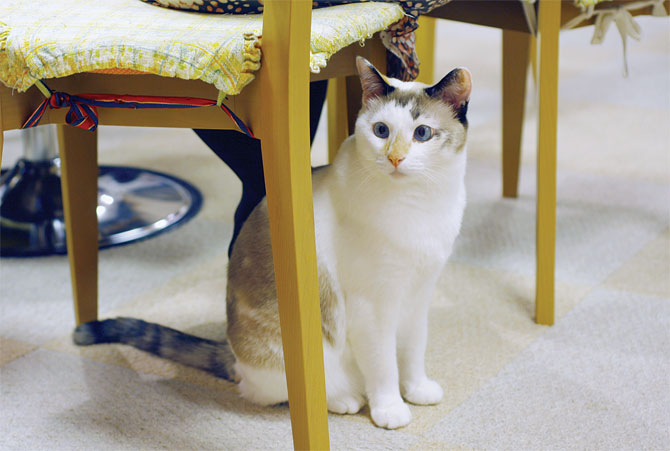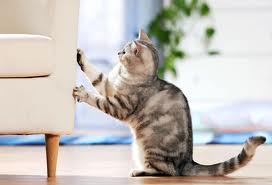MEOW MEOW MEOW
I LIKE TO HAVE TEA WITH CATS IN JAPAN BECAUSE I’M SHY
TEXT AND PHOTOS BY TOMO KOSUGA
TRANSLATED BY LENA OISHI
TRANSLATED BY LENA OISHI
 |
Cat cafés are huge in Japan right now. As the name suggests, these are coffee shops where cat lovers go to sip overpriced lattes and hang out with an adorable smoosh pile of kitties. In the past five years, exactly 79 such cafés have popped up all over Japan. What’s weird is that the café cats aren’t expensive pedigreed felines like Persians or those other ones with the funny bendy ears, they’re just the everyday mixed breeds you might find in the back lot of your local supermarket, cats who, in the immortal words of Brian Setzer, “slink down the alley, looking for a fight/Howling to the moonlight on a hot summer night.” Likewise, in the past few years, there’s been an explosion of photo books and DVDs featuring average-joe cats. If people are so fascinated by what are essentially domesticated alley cats, why don’t they just swoop one up from the legions of strays all over Japan and take them home? I’ll tell you why: because landlords in Japan are dicks.
Thirty-eight-year-old Norimasa Hanada, the owner of Neko no mise (Shop of Cats), Tokyo’s first-ever cat café, explains the problem: “Most Japanese rental apartments prohibit pets. The only ones that allow them are condominium apartments for families. This means that young, single-dwelling workers in their 20s and 30s can’t even think about getting any pets, despite the fact that they’re stressed out and are seeking comfort and companionship of some kind.”
It makes sense, then, that most cat-café fans are relatively young. More than 30 customers shuffled into and out of Neko no mise during the four hours I recently spent there, and apart from one lady in her 50s, all the other patrons were in their 20s or 30s (most of them female, with only three guys spotted the entire time). Another contributing factor to the cat-café trend is that Japanese people are chronically shy, to the extent that many can’t even hold a decent conversation about the weather with a stranger. The wordless, tactile communication of kitty cats is a great source of comfort for these high-strung, antisocial urbanites.
At Neko no mise, a few sofas, chairs, and tables were scattered throughout the café, which emanated a relaxing, feminine atmosphere complete with soft music. One wall was lined with a bookshelf full of hundreds of manga books. Apparently there are 14 resident cats at Neko no mise, and because it’s winter in Tokyo right now, most were huddled under the kotatsu (a traditional Japanese low table with an electric heater on the underside). Since the cats are obviously the kings of the café (and they know it), they seemed more arrogant than I’m used to. Some of them were skittish and jumped around every time a new person came in or walked out. I got the impression that unless you’re willing to stay for the long haul, befriending a café cat is trickier than desired, especially for an establishment that makes money off the illusion that patrons will be guaranteed some pussy lovin’.

There are a few different types of cat-café customers. Newcomers will be so swept up in the distinct atmosphere that they will just sit there stunned. It looked as if most of them had never had a pet cat or even touched one before and it seemed like they were struggling to come to terms with the unpredictable behavior of real cats while their fantasies of docile, purring balls of love were being shot to hell. In an hour’s stay, most could only manage to touch a passing cat just once. Many customers seemed like the shy, meek, silent type who were in need of a hug or two. Since these sorts don’t have the courage to go up to a cat and play with it themselves, they would read a book and sip coffee while they patiently hoped for a cat to come closer. It broke my heart.
Those who came in groups were generally cheerful and talked a lot, using the café as a place to catch up with friends. The cat factor was a bonus for them, and they grabbed the cat toys lying around and played with the cats quite successfully. The couples that I saw were either in new relationships or were still in the friendship stage, and were using the cats to bridge the awkward distance between them.
While I sipped my coffee in a room full of cats and cat groupies, I could slowly feel the soothing effects of the kitty café wash over me. Before I knew it, I was smiling for no reason and was so at ease that my eyes started to droop in a sort of happy stupor. Others must have been feeling the same numbing effects because occasionally the room full of people would fall silent as they stared at the cats’ every move.
Most customers stayed for at least one hour, but apparently some fanatics can last more than six hours. Norimasa told me that “while the average stay is an hour and a half, some regulars take a sick day from work and stay all day. They say that they’re about to buckle under the stress of their workload and need some time out. Some regulars come four or five times a week, while those who have become so mentally drained from work that they have taken an extended leave from their jobs come every day, seeking comfort and healing.”
Cat cafés generally charge a time-based fee. Neko no mise charges $1.50 every ten minutes ($9 an hour), and $21.50 for a special three-hour plan. Might sound like they’re overcharging, but maintaining a clean, dreamy cat environment ain’t cheap. The only way for cat cafés to survive is for them to maintain a high turnover rate and keep away the cheapskates who will otherwise undoubtedly stay for hours on end, nursing a single cup of coffee. Sadly, this also means that the regulars who stay for six hours end up paying more than $42 just to stroke some fur.
There’s a Japanese legend that says that cats become popular every time there’s a recession in this country, and it’s true that there’s been a huge boom in cat and cat-related-merchandise sales these past few years. Something about those pointy ears and tiny paws has a calming effect on the human mind. Or perhaps it’s the traditional Japanese culture of forcing people to behave like herds of sheep and act appropriately by carefully judging the vibe of every situation (what the Japanese literally call “reading the air”) that makes the independent, freedom-loving cat the perfect target of obsession. I know I’m making this all sound pretty sad, but like most cute things, it’s best not to think about it too much. Just stare into the hypnotizing eyes of the pretty kitties and let your troubles fall away. Purr.
WHO’S WHO AT THE CAT CAFÉ?
Thirty-eight-year-old Norimasa Hanada, the owner of Neko no mise (Shop of Cats), Tokyo’s first-ever cat café, explains the problem: “Most Japanese rental apartments prohibit pets. The only ones that allow them are condominium apartments for families. This means that young, single-dwelling workers in their 20s and 30s can’t even think about getting any pets, despite the fact that they’re stressed out and are seeking comfort and companionship of some kind.”
It makes sense, then, that most cat-café fans are relatively young. More than 30 customers shuffled into and out of Neko no mise during the four hours I recently spent there, and apart from one lady in her 50s, all the other patrons were in their 20s or 30s (most of them female, with only three guys spotted the entire time). Another contributing factor to the cat-café trend is that Japanese people are chronically shy, to the extent that many can’t even hold a decent conversation about the weather with a stranger. The wordless, tactile communication of kitty cats is a great source of comfort for these high-strung, antisocial urbanites.
At Neko no mise, a few sofas, chairs, and tables were scattered throughout the café, which emanated a relaxing, feminine atmosphere complete with soft music. One wall was lined with a bookshelf full of hundreds of manga books. Apparently there are 14 resident cats at Neko no mise, and because it’s winter in Tokyo right now, most were huddled under the kotatsu (a traditional Japanese low table with an electric heater on the underside). Since the cats are obviously the kings of the café (and they know it), they seemed more arrogant than I’m used to. Some of them were skittish and jumped around every time a new person came in or walked out. I got the impression that unless you’re willing to stay for the long haul, befriending a café cat is trickier than desired, especially for an establishment that makes money off the illusion that patrons will be guaranteed some pussy lovin’.

There are a few different types of cat-café customers. Newcomers will be so swept up in the distinct atmosphere that they will just sit there stunned. It looked as if most of them had never had a pet cat or even touched one before and it seemed like they were struggling to come to terms with the unpredictable behavior of real cats while their fantasies of docile, purring balls of love were being shot to hell. In an hour’s stay, most could only manage to touch a passing cat just once. Many customers seemed like the shy, meek, silent type who were in need of a hug or two. Since these sorts don’t have the courage to go up to a cat and play with it themselves, they would read a book and sip coffee while they patiently hoped for a cat to come closer. It broke my heart.
Those who came in groups were generally cheerful and talked a lot, using the café as a place to catch up with friends. The cat factor was a bonus for them, and they grabbed the cat toys lying around and played with the cats quite successfully. The couples that I saw were either in new relationships or were still in the friendship stage, and were using the cats to bridge the awkward distance between them.
While I sipped my coffee in a room full of cats and cat groupies, I could slowly feel the soothing effects of the kitty café wash over me. Before I knew it, I was smiling for no reason and was so at ease that my eyes started to droop in a sort of happy stupor. Others must have been feeling the same numbing effects because occasionally the room full of people would fall silent as they stared at the cats’ every move.
Most customers stayed for at least one hour, but apparently some fanatics can last more than six hours. Norimasa told me that “while the average stay is an hour and a half, some regulars take a sick day from work and stay all day. They say that they’re about to buckle under the stress of their workload and need some time out. Some regulars come four or five times a week, while those who have become so mentally drained from work that they have taken an extended leave from their jobs come every day, seeking comfort and healing.”
Cat cafés generally charge a time-based fee. Neko no mise charges $1.50 every ten minutes ($9 an hour), and $21.50 for a special three-hour plan. Might sound like they’re overcharging, but maintaining a clean, dreamy cat environment ain’t cheap. The only way for cat cafés to survive is for them to maintain a high turnover rate and keep away the cheapskates who will otherwise undoubtedly stay for hours on end, nursing a single cup of coffee. Sadly, this also means that the regulars who stay for six hours end up paying more than $42 just to stroke some fur.
There’s a Japanese legend that says that cats become popular every time there’s a recession in this country, and it’s true that there’s been a huge boom in cat and cat-related-merchandise sales these past few years. Something about those pointy ears and tiny paws has a calming effect on the human mind. Or perhaps it’s the traditional Japanese culture of forcing people to behave like herds of sheep and act appropriately by carefully judging the vibe of every situation (what the Japanese literally call “reading the air”) that makes the independent, freedom-loving cat the perfect target of obsession. I know I’m making this all sound pretty sad, but like most cute things, it’s best not to think about it too much. Just stare into the hypnotizing eyes of the pretty kitties and let your troubles fall away. Purr.
WHO’S WHO AT THE CAT CAFÉ?
 |
Left: Emiko, 22, works in fashion
Right: Yoko, 23, housewife |
Vice: Do you come here often?
Emiko: It’s my first time.
Yoko: It’s my second time. The first time I came was six months ago.
Why did you decide to stop by today?
Yoko: I love cats but I can’t get my own, so I thought I’d hang out with them here.
How did you find out about this café?
Emiko: You can see it from the platform of the train station nearby.
What do you do at a cat café?
Yoko: I just stare at the cats the whole time. Watching them makes me feel relaxed. If they happen to come near me, that’s even better.
Emiko: It’s my first time.
Yoko: It’s my second time. The first time I came was six months ago.
Why did you decide to stop by today?
Yoko: I love cats but I can’t get my own, so I thought I’d hang out with them here.
How did you find out about this café?
Emiko: You can see it from the platform of the train station nearby.
What do you do at a cat café?
Yoko: I just stare at the cats the whole time. Watching them makes me feel relaxed. If they happen to come near me, that’s even better.
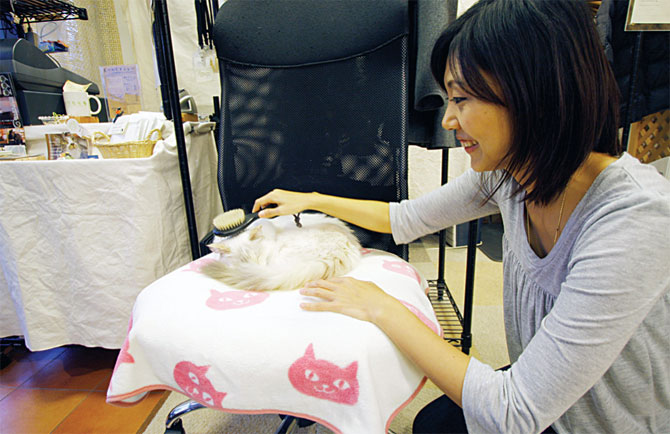 |
Kayoko, 32, kindergarten teacher
|
Vice: Are you a regular here?
Kayoko: I first visited three weeks ago, and since then I’ve been coming here every week. I’m completely hooked.
You sound like a devoted fan. How did you discover this place?I ride the Yokohama Line train a lot, and one day I saw a glimpse of the café’s interior while I was passing through. If you tiptoe you can see people playing with the cats from the train. I checked out their blog and it looked like a nice café, so I invited a friend to come with me and we found that it was a really friendly place. Now I come alone, like a lot of customers here. Chatting with other people is part of the fun.
It looked like the cat you were playing with earlier was scolded by one of the staff. What did he do?I saw him grab a stick of sugar from the table with his mouth and run, so I told one of the staff. I had heard they’re not allowed to do that. So he ended up getting scolded… Apparently that was his third time today. Other cats try to lick milk out of the pot that they bring with your coffee. Maybe that’s just their way of saying that they want to play with you.
Kayoko: I first visited three weeks ago, and since then I’ve been coming here every week. I’m completely hooked.
You sound like a devoted fan. How did you discover this place?I ride the Yokohama Line train a lot, and one day I saw a glimpse of the café’s interior while I was passing through. If you tiptoe you can see people playing with the cats from the train. I checked out their blog and it looked like a nice café, so I invited a friend to come with me and we found that it was a really friendly place. Now I come alone, like a lot of customers here. Chatting with other people is part of the fun.
It looked like the cat you were playing with earlier was scolded by one of the staff. What did he do?I saw him grab a stick of sugar from the table with his mouth and run, so I told one of the staff. I had heard they’re not allowed to do that. So he ended up getting scolded… Apparently that was his third time today. Other cats try to lick milk out of the pot that they bring with your coffee. Maybe that’s just their way of saying that they want to play with you.
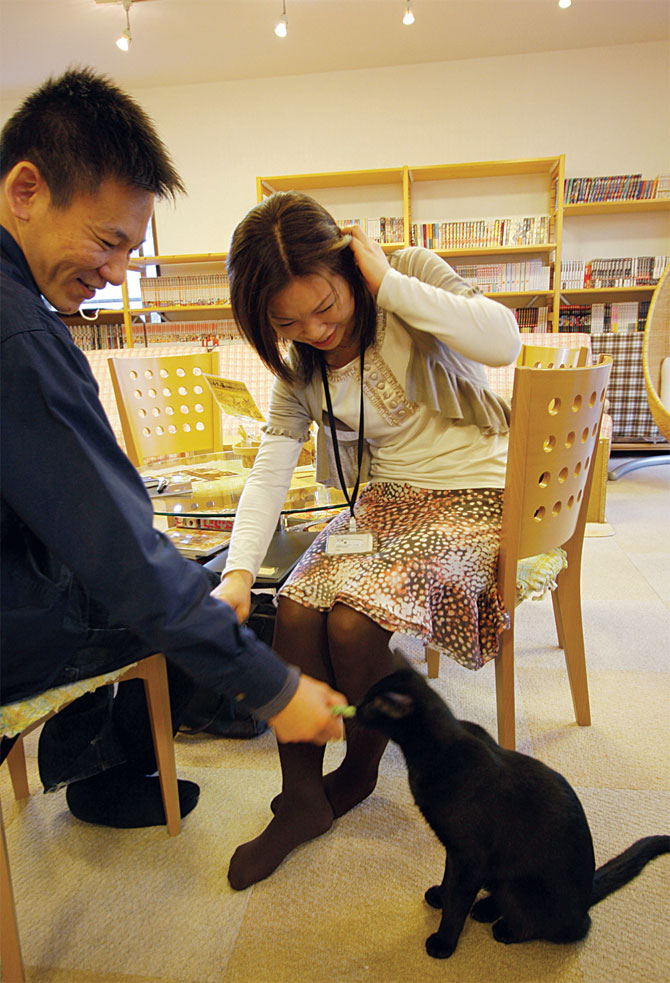 |
Left: Masataka, 32, salesperson
Right: Satoko, 36, salesperson |
Is this your first visit to a cat café?
Satoko: Yes, my boyfriend decided to bring me here today.
Masataka: I’ve been here a few times.
What’s your impression of the place?
Satoko: It’s great, there are a lot more types of cats than I expected.
How long are you planning to stay today?
Satoko: Probably about three hours.
Do you own any cats yourself?
Masataka: No.
Satoko: There are quite a few strays in my neighborhood but it’s difficult to touch them because they’re so aloof.
Are you a cat person?
Masataka: Yes, definitely.
Satoko: My parents own a dog so I’m not biased. I like all animals.
What sort of cat behavior makes you happy?
Satoko: When it rubs up against me and is generally friendly.
Masataka: When it plays with me. Or better yet, when it sits on my lap.
Satoko: Yes, my boyfriend decided to bring me here today.
Masataka: I’ve been here a few times.
What’s your impression of the place?
Satoko: It’s great, there are a lot more types of cats than I expected.
How long are you planning to stay today?
Satoko: Probably about three hours.
Do you own any cats yourself?
Masataka: No.
Satoko: There are quite a few strays in my neighborhood but it’s difficult to touch them because they’re so aloof.
Are you a cat person?
Masataka: Yes, definitely.
Satoko: My parents own a dog so I’m not biased. I like all animals.
What sort of cat behavior makes you happy?
Satoko: When it rubs up against me and is generally friendly.
Masataka: When it plays with me. Or better yet, when it sits on my lap.
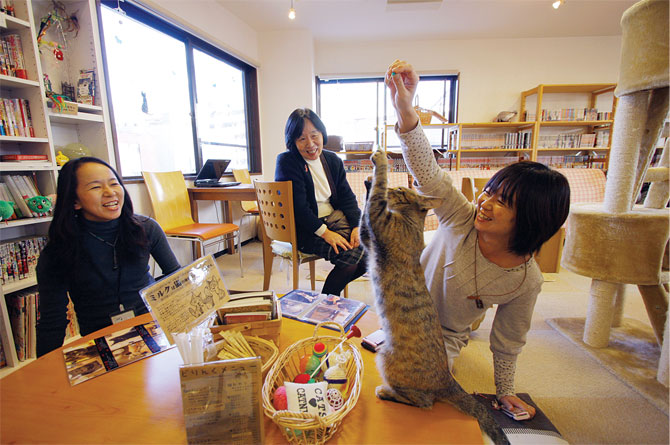 |
Botan (female) has the strange tendency to suck on her younger brother’s dick, which she mistakes for her mother’s nipple. As a result, her brother can’t help pissing all over the place.
|
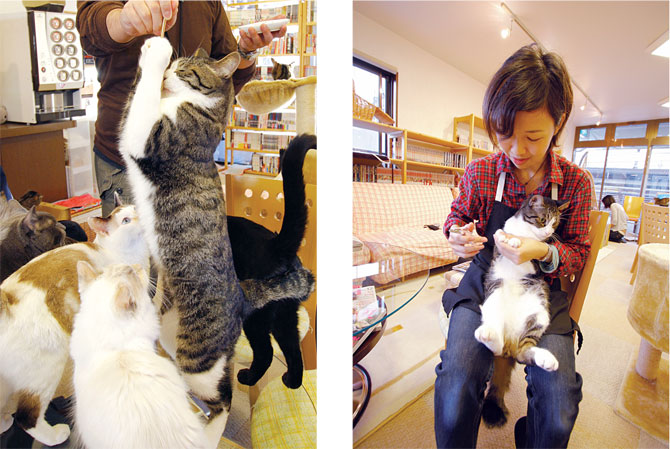 | |||
|
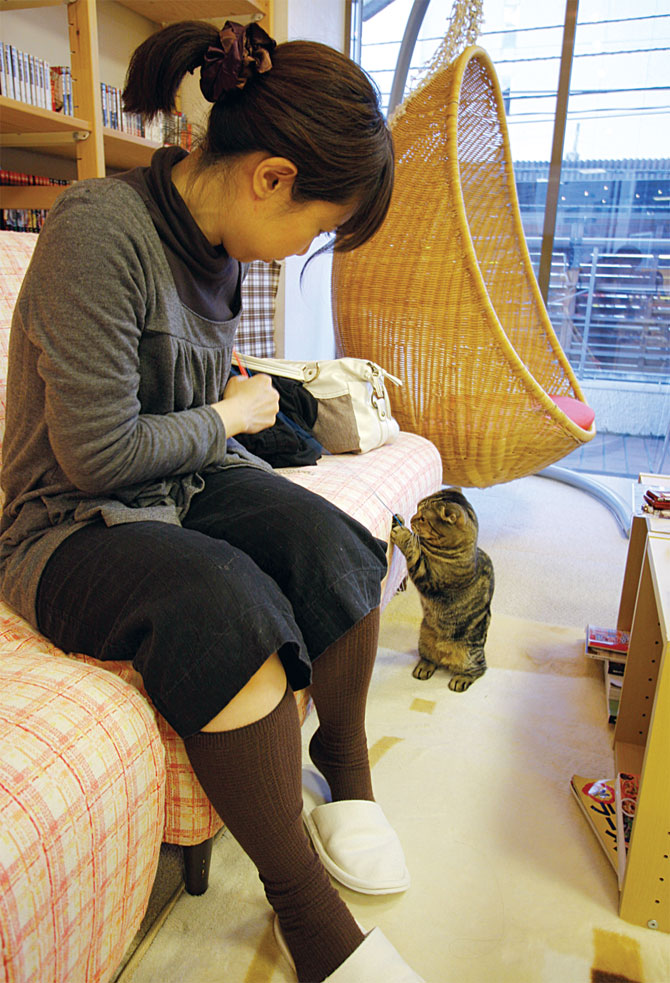 |
Megumi, 33, office worker
|
Vice: Is this your first time at a place like this?
Megumi: No, it’s my second.
Where do you live?I came from Hokkaido, which sounds awfully far away but I was scheduled to come to Tokyo anyway, so I thought I’d drop by. I always try to come here whenever I’m in Tokyo.
Wow, Hokkaido? That’s a plane ride away from Tokyo. Are there any cat cafés in Hokkaido at all?Yes, I’ve been to it. It’s probably the only one that exists there right now.
Do you feel like each cat café has its own vibe?Yes. I’ve been to a different one in Tokyo too, but from my experience I think that the cats here aren’t as afraid of strangers as they are at the other cafés and they play with you more. Maybe they’re not as stressed out because it’s a little more spacious here.
Do you own any cats yourself?I had two cats but they both died. The second one passed away last week, actually. He was 18 years old.
Sorry to hear that… What do you like about this particular café?I check the café’s blog regularly because the owner always writes so much about what’s happening here. That’s part of the appeal.
How long are you planning to stay today?Probably two or three hours. I’m kind of surprised how crowded it is today, though. I didn’t expect that.
What exactly do you do for so many hours?Mainly stare at the cats and play with them. I love it when they jump on my lap. Last time some of the cats sat on my lap, but I’m not so lucky today.
Megumi: No, it’s my second.
Where do you live?I came from Hokkaido, which sounds awfully far away but I was scheduled to come to Tokyo anyway, so I thought I’d drop by. I always try to come here whenever I’m in Tokyo.
Wow, Hokkaido? That’s a plane ride away from Tokyo. Are there any cat cafés in Hokkaido at all?Yes, I’ve been to it. It’s probably the only one that exists there right now.
Do you feel like each cat café has its own vibe?Yes. I’ve been to a different one in Tokyo too, but from my experience I think that the cats here aren’t as afraid of strangers as they are at the other cafés and they play with you more. Maybe they’re not as stressed out because it’s a little more spacious here.
Do you own any cats yourself?I had two cats but they both died. The second one passed away last week, actually. He was 18 years old.
Sorry to hear that… What do you like about this particular café?I check the café’s blog regularly because the owner always writes so much about what’s happening here. That’s part of the appeal.
How long are you planning to stay today?Probably two or three hours. I’m kind of surprised how crowded it is today, though. I didn’t expect that.
What exactly do you do for so many hours?Mainly stare at the cats and play with them. I love it when they jump on my lap. Last time some of the cats sat on my lap, but I’m not so lucky today.
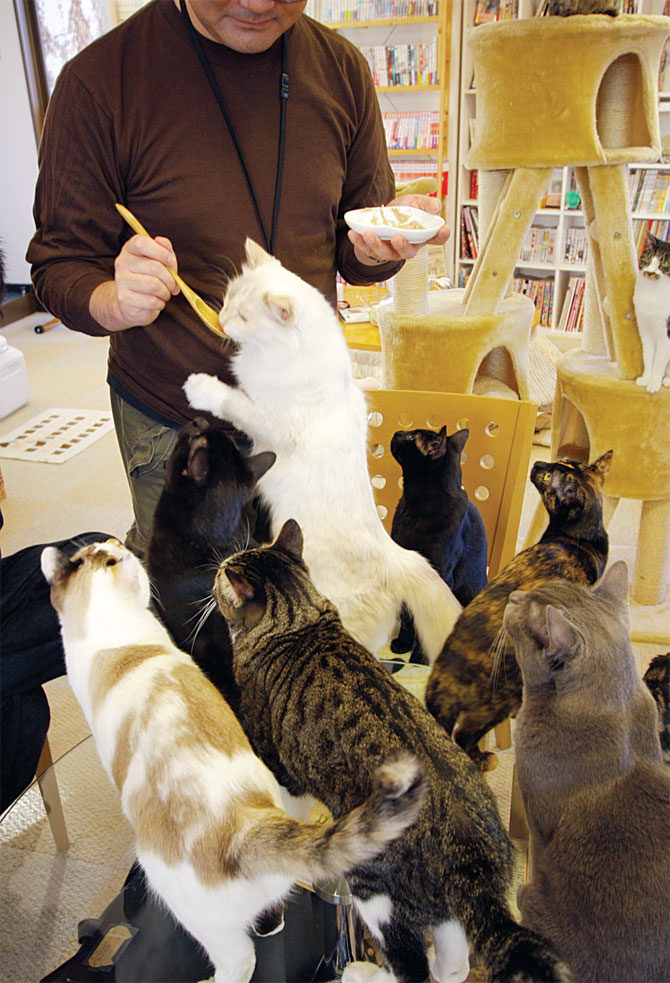 |
Nakatsuka, 39, office worker
|
Vice: What do you do when you’re at a cat café?
Nakatsuka: I mainly shoot photos of the cats. This is the only time that I ever take photos, really. I come to take a bunch of cat photos, and that’s it. I don’t even read.
So you’re saying that you own that expensive-looking camera just so that you can take pictures of cats?Yes, I bought this camera after I started coming here on a regular basis. Until then, I didn’t really care how the photos came out or what type of camera I used, but after shooting for a while I gradually felt an urge to use a better camera.
How often do you come here?Once a week.
And where do you live?In Saitama prefecture. It takes an hour and 20 minutes to get here.
How long do you usually stay?About six hours, so I guess I use up a whole day. Sometimes I even take a paid day off work just to come.
So including the commute, that means each visit takes about nine hours! Have you always liked cats?Yes, I’ve always loved animals. We had a pet cat when I was little, but now I live alone and can’t really own one myself, which is why I come here. Just looking at them makes me feel at ease.
Is there anything the cats do that make you extra happy?I love it when I’m playing with a cat using a cat toy, and the cat grabs my knee with its paws.
Nakatsuka: I mainly shoot photos of the cats. This is the only time that I ever take photos, really. I come to take a bunch of cat photos, and that’s it. I don’t even read.
So you’re saying that you own that expensive-looking camera just so that you can take pictures of cats?Yes, I bought this camera after I started coming here on a regular basis. Until then, I didn’t really care how the photos came out or what type of camera I used, but after shooting for a while I gradually felt an urge to use a better camera.
How often do you come here?Once a week.
And where do you live?In Saitama prefecture. It takes an hour and 20 minutes to get here.
How long do you usually stay?About six hours, so I guess I use up a whole day. Sometimes I even take a paid day off work just to come.
So including the commute, that means each visit takes about nine hours! Have you always liked cats?Yes, I’ve always loved animals. We had a pet cat when I was little, but now I live alone and can’t really own one myself, which is why I come here. Just looking at them makes me feel at ease.
Is there anything the cats do that make you extra happy?I love it when I’m playing with a cat using a cat toy, and the cat grabs my knee with its paws.
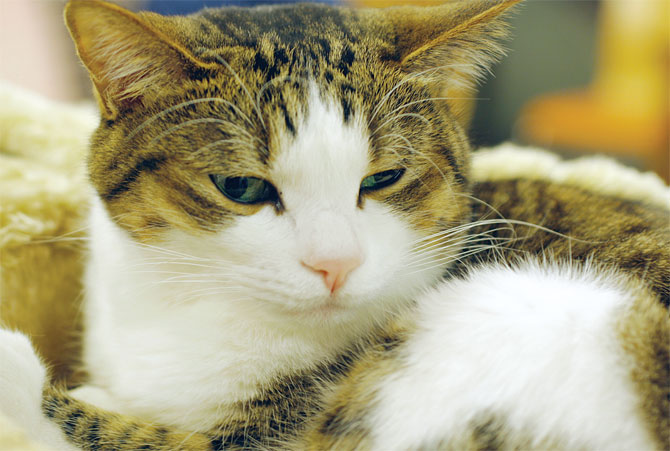 |
Pocky (female). Who’s a pretty?
|
Shiratama (female). Usually quiet, this one likes being stroked and doesn’t run away.
|
Did you enjoy that article? Sure you did. Now you should check out:


